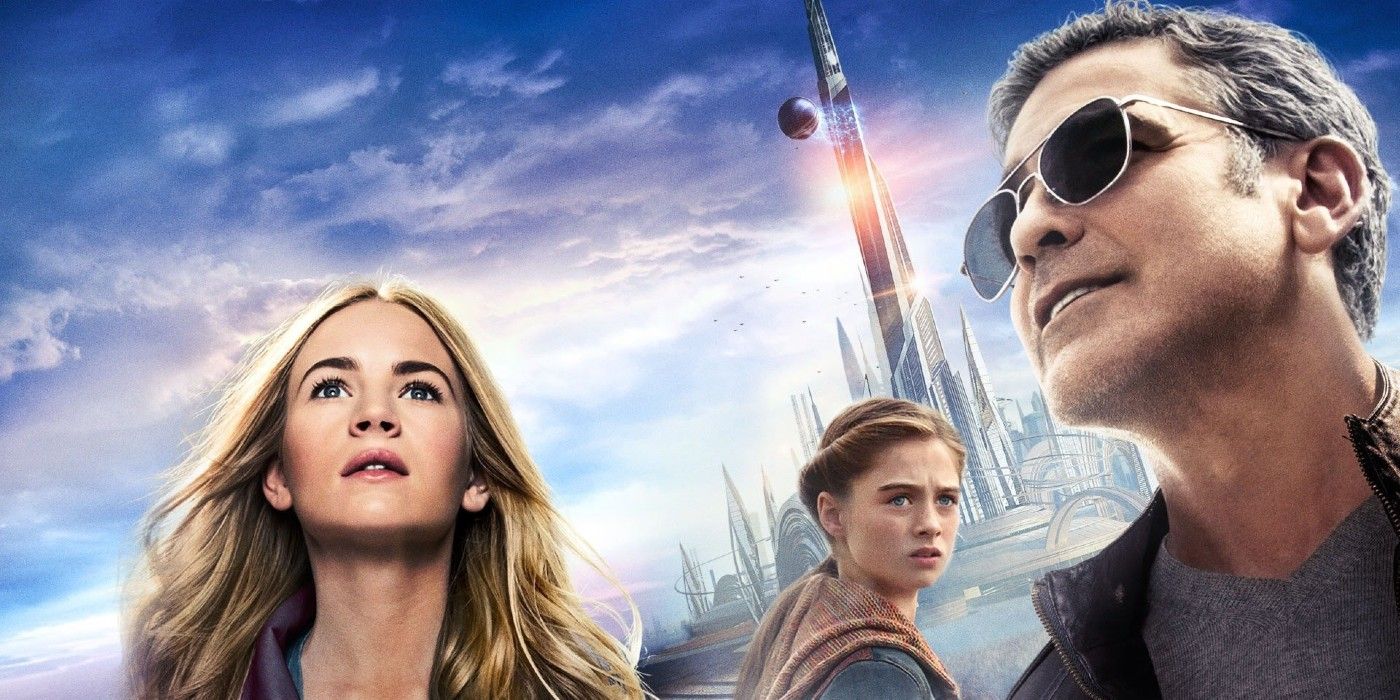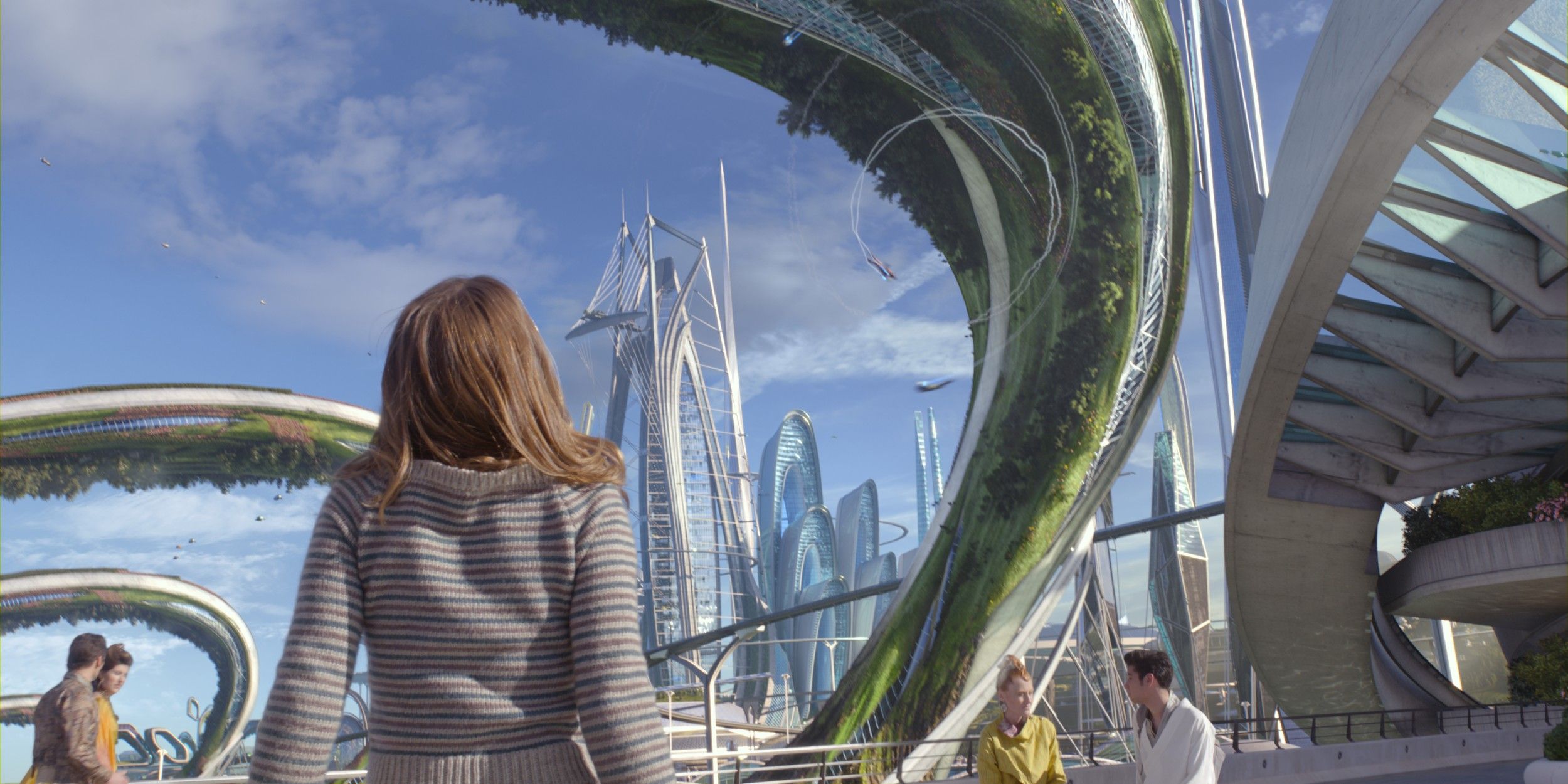Brad Bird's Tomorrowland is one of the more ambitious movies Disney's released in a while, but (for multiple reasons) it bombed at the box office. The brainchild of Bird and writers Damon Lindelof and Jeff Jensen, the film isn't so much an adaptation of the classic Disney theme park land of the same name as an original sci-fi adventure loosely inspired by the land's optimistic vision of the future. It was also a highly secretive project during its development (even going under the working title 1952 early on), so few knew what to expect before the Tomorrowland marketing kicked off.
The movie stars Britt Robertson as Casey Newton, a bright-eyed, tech-savvy teenager who discovers the existence of an alternate-dimension cityscape known as Tomorrowland and gets Frank Welker (George Clooney), a disillusioned inventor who was banished from Tomorrowland years earlier, to (begrudgingly) take her there, in the hopes of uncovering the truth about the fate of the world. Also along for the ride is Athena (Raffey Cassidy), a droid from Tomorrowland who "recruited" Frank long ago and believes Casey has the potential to change the world for the better.
Despite having the power of the Mouse House behind it (and being literally named after a Disney theme park land), Tomorrowland didn't have a ton of buzz ahead of its release in 2015 and only grossed $209 million at the box office - nowhere near enough to cover its $190 million budget (not counting marketing costs). Arguably, the trailers were part of the problem and didn't really do a great job of explaining what the movie was even about, or playing up its niftier set pieces (like a sequence where the Eiffel Tower transforms into a dimension-hopping antique rocket). This was partly to avoid spoiling the plot and later trailers admittedly did a better job of highlighting the action, yet even then they struggled to explain the basic stakes of the story, so the whole thing felt a little hollow.
To be fair, the Tomorrowland marketing team didn't exactly have an easy job; there is a lot going on in the film, and it's near-impossible to neatly compress it into a two-minute preview. Not helping matters, reviews were mixed for Tomorrowland, with critics praising its giddy sense of pacing and cartoony action (both hallmarks of Bird's filmmaking style, as evidenced by The Incredibles 1 & 2 and Mission: Impossible - Ghost Protocol), but taking it to task for an underwhelming third act and a message about the importance of positive thinking that, while well-intentioned, comes across as a little shallow due to its unwillingness to address where the world's problems stem from. As much as there is to like about Tomorrowland and its passion, even many of its supporters would admit it can be a bumpy ride.
Some Disney titles (like Star Wars and MCU) can get away with overly mysterious marketing and/or lukewarm reviews, but the combination was too much for a (mostly) original movie like Tomorrowland. But even then, its massive budget was another factor that led to the film bombing. Had it cost half as much or "only" $100 million to make, it would've broken even or come close to doing so. Instead, much like it had done with John Carter and Lone Ranger, the Mouse House simply threw too much money at a project that was anything but a surefire bet, even if everything else had gone right. And while there's something admirable about the studio spending that kind of cash on what was clearly a personal production for its creators (as opposed to one of Disney's paint-by-numbers live-action remakes), things just didn't pan out here.
Still, all talk of its flaws aside, there's a lot to like about Tomorrowland - and if Disney's going to gamble on anything, it ought to be ambitious and creative undertakings like this and the few non-sequels and non-remakes the studio has green-lit in the years since it came out (see also: A Wrinkle in Time). Who knows: perhaps younger generations will rediscover the movie (be it on home media or streaming via Disney+) down the line and embrace it far more than audiences originally did.


